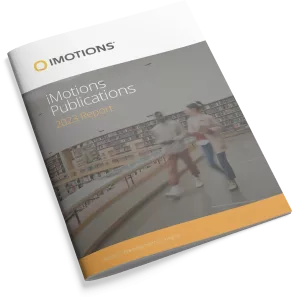-
(Not) the right time for social media ads? Exploring the impact of social media detox on attention to the ad
Social media takes up a large part of consumers’ daily time. In response, social media detox is on the rise, such that consumers set time constraints or even take complete social media time-outs. Research into the effects of such detox phases on the effectiveness of advertising is critical but lacking. Two qualitative studies identify motivations […]
-
Measuring the Benefits of Plants: Visual Exposure and Human Well-being Impacts of Lush Streetscapes
This research seeks to explore how exposure to horticultural elements in the streetscape may impact cardiovascular health and well-being. We used advanced facial expression and heat-mapping technology software to compare preconscious levels of attentiveness, gaze path, facial expressions, and fixation on images (emotional responses) with and without horticultural elements among 47 adult participants. We found […]
-
People’s experience of urban transformation: eye-tracking architectural qualities of the post-industrial NDSM wharf in Amsterdam
Urban densification continues unabated, even as the possible consequences for users’ eye-level experiences remain unknown. This study addresses these consequences. In a laboratory setting, images of the NDSM wharf were shown to university students primed for one of three user groups: residents, visitors and passers- by. Their visual experiences were recorded using eye-tracking and analyzed […]
-
Utilizing Sensory and Visual Data in the Value Estimation of Extra Virgin Olive Oil
Food evaluation is a topic central to consumer research and food marketing. However, there is little consensus regarding how consumers combine sensory stimuli, product information, and visual impressions to shape their evaluation. Moreover, the bulk of research relies on studies based on questionnaires and declarative responses, raising questions about subliminal processes and their hierarchy in […]
-
Predicting consumer ad preferences: Leveraging a machine learning approach for EDA and FEA neurophysiological metrics
This research unveils to predict consumer ad preferences by detecting seven basic emotions, attention and engagement triggered by advertising through the analysis of two specific physiological monitoring tools, electrodermal activity (EDA), and Facial Expression Analysis (FEA), applied to video advertising, offering a twofold contribution of significant value. First, to identify the most relevant physiological features […]
-
Enhancing Imaging Anatomy Competency: Integrating Digital Imaging and Communications in Medicine (DICOM) Viewers Into the Anatomy Lab Experience
Introduction: Radiologic interpretation is a skill necessary for all physicians to provide quality care for their patients. However, some medical students are not exposed to Digital Imaging and Communications in Medicine (DICOM) imaging manipulation until their third year during clinical rotations. The objective of this study is to evaluate how medical students exposed to DICOM […]
-
Shaken, not stirred: Effects of Minimal Rotational Motion Cues on Cybersickness in a VR Flying Experience
Cybersickness (CS), a visually induced motion sickness causing unwanted symptoms like nausea, disorientation, and vertigo, remains a significant issue in Head-Mounted-Display (HMD) based virtual environments, hindering the mainstream adoption of Virtual Reality (VR). The exact cause of cybersickness is still not conclusively clarified, however the predominant theory of sensory conflict suggests that the discrepancy between […]
-
Cognitive load associated with speaking clearly in reverberant rooms
Communication is a fundamental aspect of human interaction, yet many individuals must speak in less-than-ideal acoustic environments daily. Adapting their speech to ensure intelligibility in these varied settings can impose a significant cognitive burden. Understanding this burden on talkers has significant implications for the design of public spaces and workplace environments, as well as speaker […]
-
Cannabis Users’ and Non-Users’ Differential Responses to Two Anti-Cannabis Campaigns
Even though multiple states have approved legal recreational use of cannabis, the expansion of recreational cannabis legalization has led to public health concerns in the United States. Young adults (18–25 years old) have the highest percentage of cannabis use disorder compared to all other age groups. The purpose of this study is to compare cognitive […]
-
AI-enhanced analysis of naturalistic social interactions characterizes interaffective impairments in schizophrenia
Social deficits in schizophrenia have been attributed to an impaired attunement to mutual interaction, or “interaffectivity”. While impairments in emotion recognition and facial expressivity in schizophrenia have been consistently reported, findings on mimicry and social synchrony are inconsistent, and previous studies have often lacked ecological validity. To investigate interaffective behavior in dyadic interactions in a […]
Research Report 2024
In-depth look at the scientific landscape as powered by iMotions software, showcasing groundbreaking research and the impact of our tools in various scientific and industrial fields.
iMotions Science Resources
Looking for white papers, validation reports or research show casing iMotions Multimodal capabilities?
Share Your Research

850+ universities worldwide with an iMotions human behavior lab
73 of the top 100 highest ranked universities
710+ published research papers using iMotions
iMotions is used for some of the most interesting human behavior research studies carried out by top researchers around the world. Contact us to have your publication featured here.
The authors of these publications have used iMotions as a software tool within their research.
“Software should be cited on the same basis as any other research product such as a paper or a book; that is, authors should cite the appropriate set of software products just as they cite the appropriate set of papers” (Katz et al., 2020).
We therefore encourage you to cite the use of iMotions where appropriate.
How to cite iMotions
APA
iMotions (10), iMotions A/S, Copenhagen, Denmark, (2024).
Note: adjust the version and year where relevant.
5 Most Popular Blogs
Learn How to Conduct Human Behavior Research with iMotions
Publications
Read publications made possible with iMotions
Blog
Get inspired and learn more from our expert content writers
Newsletter
A monthly close up of latest product and research news




